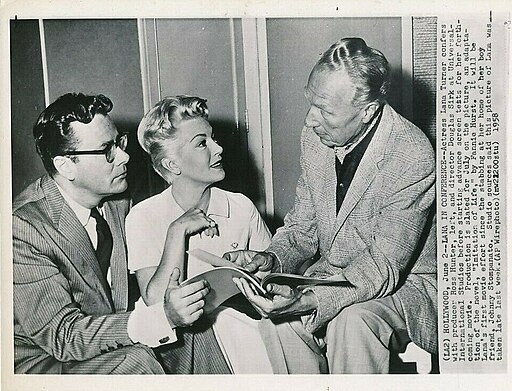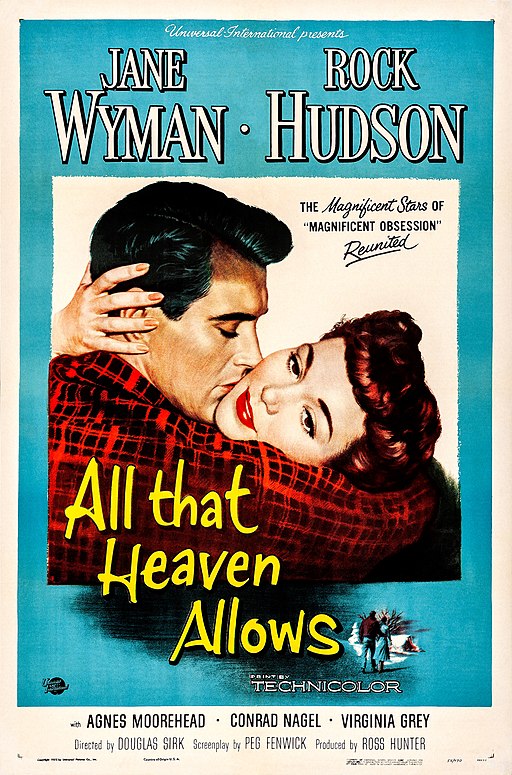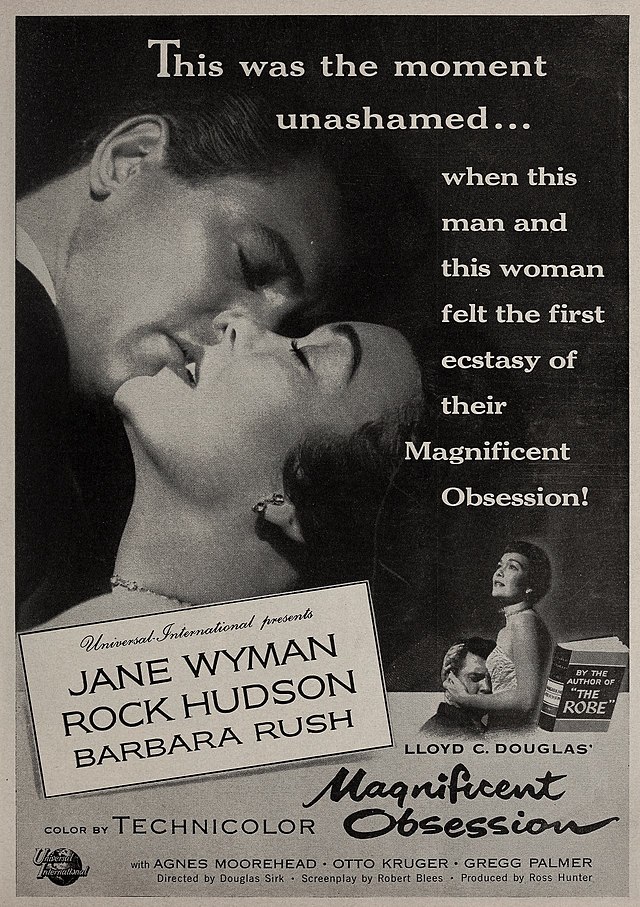Douglas Sirk
back| Full Name | Hans Detlef Sierck |
| Born | April 26, 1897 |
| Birthplace | Hamburg, German Empire |
| Died | January 14, 1987 |
| Buried | Lugano Cemetery, Lugano, Switzerland |
| Married to | Lydia Brinken (m. 1922; div. 1924) - Lili Körber (m. 1937; her death 1952) - Hilde Jary (m. 1953; his death 1987) |
| Children | Klaus Detlef Sierck |
| Notable films | Magnificent Obsession (1954) - All That Heaven Allows (1955) - Written on the Wind (1956) - Imitation of Life (1959) |
Douglas Sirk
The Master of Melodramatic Subversion
Douglas Sirk's films are known for their bright, expressive color schemes and their complex, sometimes ironic, take on American culture, particularly in the context of family life and class distinctions. His work significantly influenced later filmmakers and he is often credited for elevating the melodrama genre.
Related
Douglas Sirk (1897 – 1987)
Biography and Career Overview
Hans Detlef Sierck, who would later be known as Douglas Sirk, was born on April 26, 1897, in Hamburg, German Empire. He was raised in a cosmopolitan and educated environment. His early exposure to the arts profoundly influenced his later work. Sirk's academic journey led him to the University of Hamburg, where he studied German, philosophy, and art history.
Early Career: Sirk's career began in the theater. He worked extensively as a stage director in Germany, cultivating a strong reputation for his innovative and intellectual approach to the medium. His work in the theater laid the groundwork for his unique cinematic style.
Personal Life: Sirk's personal life was marked by several significant relationships. He first married Lydia Brinken in 1922, but they divorced two years later. He then married Lili Körber, a politically active writer, in 1937. Their union was marked by the turbulent times in Germany, as Lili was Jewish and the rise of Nazism posed a direct threat to their family. The couple had one son, Klaus Detlef Sierck. Following Lili's death in 1952, Sirk remarried in 1953 to Hilde Jary.
Emigration and Hollywood Career: With the rise of the Nazi regime, Sirk, troubled by the political situation and concerned for his Jewish wife, left Germany in 1937. He first moved to France and then to the United States in 1939. In Hollywood, he initially faced challenges due to language barriers and the need to adapt to a new film culture.
Rise to Fame: Sirk's Hollywood career is most renowned for his work in the 1950s, where he directed a series of melodramas for Universal-International. His films from this era are characterized by their lush visual style, complex characters, and a poignant critique of contemporary American society, especially its materialism and class structures. Notable films include "Magnificent Obsession" (1954), "All That Heaven Allows" (1955), "Written on the Wind" (1956), and "Imitation of Life" (1959).
Style and Influence: Sirk's films are marked by their expressive use of color, elaborate sets, and meticulous compositions. He had a unique ability to blend surface glamour with deep, often critical, emotional and social undercurrents. This stylistic and thematic approach influenced many filmmakers and helped to elevate the status of melodrama in cinema.
Later Years and Death: After his Hollywood success, Sirk left the film industry in the late 1950s. He spent his later years in Switzerland, where he focused on writing and theater. Sirk passed away on January 14, 1987, in Lugano, Switzerland. His influence, however, continues to be felt in the film industry, and his films are celebrated for their artistic depth and social commentary.
Through his unique vision, Douglas Sirk left an indelible mark on cinema, transforming the melodrama genre and offering profound insights into the human condition and society.
Interview with Douglas Sirk in 1979:
Analysis of Douglas Sirk’s Directing Style:
Douglas Sirk, renowned for his work in Hollywood melodramas of the 1950s, developed a unique and influential directing style. Here's an analysis of the key elements of his style:
Melodrama as a Genre: Sirk is best known for his melodramas, a genre he elevated and redefined. He used melodrama to explore deep social and personal issues, often focusing on themes such as class, gender roles, and family dynamics. His films were not just about individual characters but also commented on the broader societal context.
Visual Style: Sirk's films are characterized by their lavish and expressive visual style. He used color and composition to enhance the emotional depth of his stories. His use of vibrant colors, especially in Technicolor films, created a vivid, almost hyper-real aesthetic. The meticulous framing and composition of shots in his films often conveyed characters' emotional states or social positions.
Irony and Subversion: One of the most distinctive aspects of Sirk's work is his use of irony. On the surface, his films often conform to the conventions of 1950s American culture, but beneath the surface, they frequently contain a subtle critique of that culture. This subversion is particularly evident in his portrayal of the American middle class and the disillusionment with the so-called "American Dream."
Emotional and Narrative Complexity: Sirk's films, while melodramatic, are noted for their emotional depth and complexity. He had a unique ability to evoke empathy and emotional responses from the audience. The narrative structure in his films often involves complex relationships and moral dilemmas, which he used to explore the human condition.
Use of Mirrors and Windows: Sirk often used mirrors and windows in his films as a means of reflection and introspection, both literally and metaphorically. These elements were used to symbolize the internal conflicts of characters or to offer a critique of societal norms and expectations.
Influence on Later Filmmakers: Sirk's influence extends far beyond his immediate body of work. Filmmakers like Rainer Werner Fassbinder, Pedro Almodóvar, and Todd Haynes have cited Sirk as an influence. His ability to blend aesthetic beauty with deep social critique in a melodramatic framework has inspired many directors to explore similar themes in their work.
Music and Soundtrack: Sirk often used music strategically to heighten the emotional impact of his scenes. The soundtrack in his films is carefully chosen to complement the visual style and narrative tone, often adding another layer of meaning or emotion to the scene.
Characters and Casting: Sirk's characters are often caught in conflicts between personal desires and societal expectations. He had a knack for casting actors who could bring these complex characters to life, often working with the same actors (like Rock Hudson and Jane Wyman) in multiple films, which helped in creating nuanced performances that were critical to his style.
In summary, Douglas Sirk's directing style is marked by a blend of visual opulence, emotional depth, narrative complexity, and a subtle critique of societal norms. His films, while initially viewed as simple melodramas, have gained recognition for their artistic depth and continue to be studied and appreciated for their innovative approach to storytelling and visual style.
Awards and Recognition:
Douglas Sirk, despite his significant influence on cinema and the enduring legacy of his films, did not receive a large number of awards and nominations during his career, especially in comparison to the recognition given to contemporary directors. This is partly due to the nature of his work, which gained critical reevaluation and acclaim largely after his active period in filmmaking. However, here are some key acknowledgments and honors associated with Sirk:
- Venice Film Festival: Sirk's film "Zu neuen Ufern" (To New Shores) won the Mussolini Cup for Best Foreign Film in 1937. This was a significant achievement at the time and helped to raise his profile in the international film community.
- Posthumous Recognition: Much of the recognition for Sirk's work came posthumously. Film scholars, critics, and directors have lauded his contributions to the melodrama genre and his influence on cinema.
- Cinematic Influence: While not an award in the traditional sense, Sirk's impact on filmmakers like Rainer Werner Fassbinder, Todd Haynes, and Pedro Almodóvar is a testament to his legacy. These filmmakers have openly cited Sirk as a major influence on their work, which in itself is a significant accolade.
- Film Festival Tributes: Various film festivals and retrospectives have honored Sirk's work. These events often highlight his contribution to the film industry and the unique style he brought to his films.
- Critical Reappraisal: The critical reappraisal of Sirk's work, particularly in the 1970s and 1980s, has been an important form of recognition. His films, initially seen as standard Hollywood melodramas, have been reevaluated as complex, artistically rich works that offer a subtle critique of society and human emotions.
- Academic Study: Sirk's films are widely studied in film courses and are the subject of numerous academic papers and books. This scholarly attention, while not a traditional award, underscores the significance of his contributions to film.
- Influence on Modern Cinema: The stylistic and thematic elements of Sirk's films have been seen in modern cinema, and his influence is often acknowledged by contemporary filmmakers and critics.
Memorable Quotes from Douglas Sirk:
On Cinematic Style:
- "Cinema is blood, tears, violence, hate, death, and love."
Regarding Melodrama:
- "There is a very short distance between high art and trash, and trash that contains an element of craziness is by this very quality nearer to art."
On Film as a Reflection of Society:
- "Every work of art is the child of its time, often it is the mother of our emotions."
Discussing the Role of a Director:
- "A director's job is to preside over accidents."
On the Art of Filmmaking:
- "This is what I am always saying: the director is the one who holds the brush, but the color is supplied by all these other people."
Regarding Audience Interpretation:
- "You cannot make films about films, but you can make films about how films are not films."
On the Nature of Reality in Cinema:
- "The angles are the director's thoughts. The lighting is his philosophy."
Concerning Storytelling:
- "A story should have a beginning, a middle, and an end… but not necessarily in that order."
Movies directed by Douglas Sirk:
1935
- "The Girl from the Marsh Croft" (Das Mädchen vom Moorhof): A drama about a young woman who, after being falsely accused of having an affair with a married man, moves to a new village to start over.
1936
- "Schlußakkord" (Final Accord): This film centers around a famous conductor who discovers a talented young boy and decides to adopt him.
1937
- "La Habanera": The story of a Swedish woman who marries a wealthy Puerto Rican plantation owner, only to fall in love with a doctor amidst a yellow fever epidemic.
1938
- "Zu neuen Ufern" (To New Shores): A London singer is sent to a penal colony in Australia, where she falls in love with a farmer.
1939
- "Boefje": A Dutch film about a young boy from a poor family who gets into trouble and ends up in a reformatory.
1943
- "Hitler's Madman": A war drama about the assassination of Nazi leader Reinhard Heydrich and the subsequent destruction of the Czech village of Lidice.
1944
- "Summer Storm": A Russian judge recalls his last encounter with a beautiful gypsy who he met while presiding over her trial for murder.
1946
- "A Scandal in Paris": A biographical film about the life of Eugène François Vidocq, a French criminal who later became the head of police.
1947
- "Lured": A thriller about a London police detective who enlists an American drama student in a scheme to trap a serial killer.
1948
- "Sleep, My Love": A drama about a woman who is nearly driven to suicide by her husband and his lover's gaslighting.
1949
- "Shockproof": A parole officer falls in love with his parolee, a woman convicted of manslaughter.
1950
- "The First Legion": A drama set in a Jesuit seminary, focusing on the crisis of faith experienced by the seminarians.
- "Mystery Submarine": A naval officer is court-martialed for losing his ship, but he is later reinstated to help find the mystery submarine that sunk his previous ship.
1951
- "The Lady Pays Off": A romantic comedy about a schoolteacher who wins a trip to Las Vegas and ends up in debt to a casino owner.
- "Weekend with Father": A romantic comedy revolving around a widower and a widow who meet at a vacation spot where they have both brought their children.
1952
- "No Room for the Groom": A comedy about a newlywed couple who can't seem to get a moment alone together.
- "Has Anybody Seen My Gal?": A family comedy about a wealthy man who anonymously gives a small fortune to a family in his old hometown to see how they handle it.
1953
- "Take Me to Town": A musical western about a saloon singer who hides out in a small town and becomes involved with the local minister.
- "All I Desire": A drama about a woman who abandoned her family to pursue an acting career and then returns home to see her daughter's high school play.
1954
- "Magnificent Obsession": A romantic drama about a playboy who becomes a surgeon to atone for his past after his reckless behavior indirectly causes a widow's husband's death.
- "Taza, Son of Cochise": A western about the Apache leader Cochise's son, who tries to keep the peace after his father's death.
1955
- "All That Heaven Allows": A melodrama about a romance between a well-to-do widow and her much younger landscaper, which leads to gossip and strained relationships with her children.
1956
- "There's Always Tomorrow": A melodrama about a toy manufacturer who feels neglected by his wife and children and rekindles a romance with an old flame.
- "Written on the Wind": A drama about the son of a Texas oil magnate who causes self-destructive problems through his reckless and excessive lifestyle.
1957
- "Battle Hymn": Inspired by the true story of Colonel Dean Hess, a pilot turned minister who rejoined the service in the Korean War.
1958
- "Interlude": A drama about a young American woman who falls in love with a famous conductor, despite him being married.
1959
- "Imitation of Life": A drama about the complex relationship between a struggling actress and her black housekeeper, along with their respective daughters.







